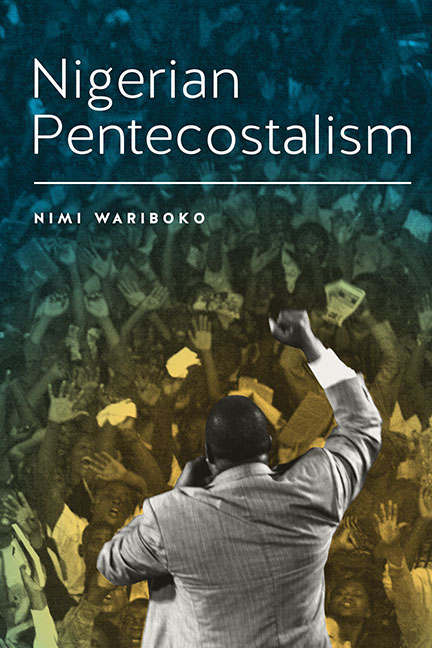Book contents
- Frontmatter
- Dedication
- Contents
- Foreword
- Preface
- Acknowledgments
- Introduction
- Part 1 Origins and Spirituality of Nigerian Pentecostalism
- Part 2 Ethical Vision of Nigerian Pentecostal Spirituality
- 6 Politics: Between Ontology and Spiritual Warfare
- 7 Miracles, Sovereignty, and Community
- 8 Altersovereignty and Virtue of Pentecostal Friendship
- 9 Spirituality and the Weight of Blackness
- 10 “This Neighbor Cannot Be Loved!”: Invisibility and Nudity of the “Pentecostal Other”
- 11 Pentecostalism and Nigerian Society
- Notes
- Bibliography
- Index
10 - “This Neighbor Cannot Be Loved!”: Invisibility and Nudity of the “Pentecostal Other”
from Part 2 - Ethical Vision of Nigerian Pentecostal Spirituality
Published online by Cambridge University Press: 15 March 2018
- Frontmatter
- Dedication
- Contents
- Foreword
- Preface
- Acknowledgments
- Introduction
- Part 1 Origins and Spirituality of Nigerian Pentecostalism
- Part 2 Ethical Vision of Nigerian Pentecostal Spirituality
- 6 Politics: Between Ontology and Spiritual Warfare
- 7 Miracles, Sovereignty, and Community
- 8 Altersovereignty and Virtue of Pentecostal Friendship
- 9 Spirituality and the Weight of Blackness
- 10 “This Neighbor Cannot Be Loved!”: Invisibility and Nudity of the “Pentecostal Other”
- 11 Pentecostalism and Nigerian Society
- Notes
- Bibliography
- Index
Summary
Hell is other people.
—Jean-Paul SartreIntroduction
The chapter is designed to do three important things. Its first task is to highlight the theoretical contributions of this book to the study of Pentecostal Christianity and sum up its arguments. This is will enable us to clearly see the body of knowledge and concepts I have crafted so far. As stated in the introduction, one of the general goals of this book is to show how Pentecostal spirituality helps us to understand Nigerian society. It also to enables us to grasp how Nigeria's society and culture help us to understand its brand of Pentecostalism. This first task is divided into two steps. Immediately after this introduction, I reflexively explore the analyses and findings of the study to draw out and define its theoretical construct. I name this construct a theory of Pentecostal spiritual quest. It lays out the argument of the whole book. The second step of my discussion of the contribution made by this book will be organized around the notion of spiritual discernment, comparing Nigerian Pentecostals’ interpretation of it with that of academic theologians.
The remaining two tasks of the chapter will be to apply its insights to social issues of love and grace in human socialities. The second task is to use the theoretical construct of Pentecostal spiritual quest to critically examine the notion and practice of neighborly love in Nigerian Pentecostalism. Pentecostals’ mode of knowing, of separating truth from falsehood, has driven them to a “theory of the neighbor” that intrinsically rejects the Christian commandment “love your neighbor as yourself.” This is also a rejection of key aspects of the traditional African understanding of communality.
The third task is to examine how the Pentecostals’ mode of knowing or discernment relates to the operation of divine grace in human socialities. Pentecostals claim that “seeing eyes” are a spiritual gift, a divine grace that operates in their lives. But the grace or gift that uncovers the innermost secrets of the neighbor seems to operate differently from the orthodox understanding of grace. This difference appears to have rendered grace inoperative, in the Agambean sense of the word. This inoperativity of grace and its connection to invisibility raise social questions about Pentecostalism and Nigerian society, which I will tackle in chapter 11.
- Type
- Chapter
- Information
- Nigerian Pentecostalism , pp. 258 - 277Publisher: Boydell & BrewerPrint publication year: 2014

